八年级上U1—U4语法
八年级上册英语各单元语法汇总

Unit1 Where did you go on vacation?【重点语法】不定代词:不指名代替任何特定名词或形容词的代词叫做不定代词。
用法注意:1. some 和any +可数名/不可数名。
some 多用于肯定句,any多用于否定句、疑问句和条件从句。
有些问句中用some,不用any, 问话者希望得到对方肯定回答。
2. 由some, any, no, every 与body, one, thing构成的复合不定代词作主语时,其谓语动词用三单。
3. 不定代词若有定语修饰,该定语要置于其后:如:something interestingUnit2 How often do you exercise?【重点语法】1. 频率副词: always, usually, often, sometimes, never频率副词在句中通常放在实义动词之前, be动词或助动词之后。
常用于一般现在时态中。
2.“次数”的表达方法一次once,两次twice,三次或三次以上:基数词+ times, 如:three times, five times,3. how often“多久一次”问频率,回答常含有频率词组或短语。
常见的how疑问词:1)How soon 多久(以后)—How soon will he be back?他多久能回来?—He will be back in a month. 他一个月后能回来。
2)how long “多久”—How long did it take you to clean the house? 你打扫房子用了多久?—It took me half an hour to clean the house. 我打扫这房子用了半小时。
3)How many+名复How much+不可名“多少” 问数量(how much 还可问价格)Unit3 I’m more outgoing than my sister.【重点语法】1. 形容词和副词的比较等级(1)形容词和副词的原形就是原级(2)比较级,表示较……或更……(3)最高级,表示最…。
八年级上 U1-U4 笔记整理
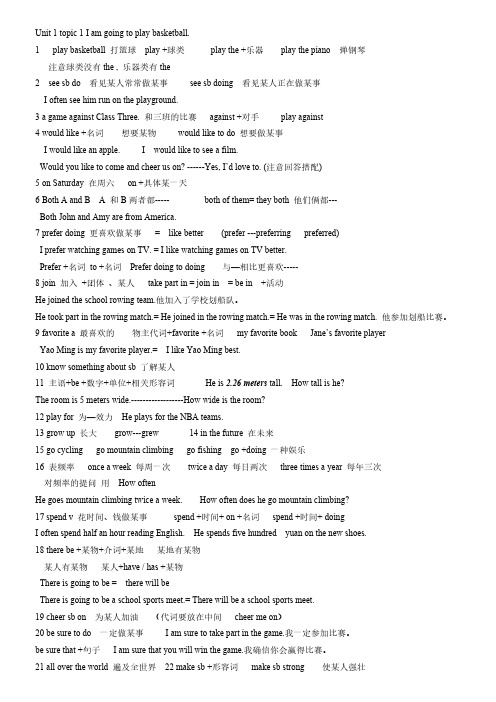
Unit 1 topic 1 I am going to play basketball.1 play basketball 打篮球play +球类play the +乐器play the piano 弹钢琴注意球类没有the , 乐器类有the2 see sb do 看见某人常常做某事see sb doing 看见某人正在做某事I often see him run on the playground.3 a game against Class Three. 和三班的比赛against +对手play against4 would like +名词想要某物would like to do 想要做某事I would like an apple. I would like to see a film.Would you like to come and cheer us on? ------Yes, I’d love to. (注意回答搭配)5 on Saturday 在周六on +具体某一天6 Both A and B A 和B两者都----- both of them= they both 他们俩都---Both John and Amy are from America.7 prefer doing 更喜欢做某事= like better (prefer ---preferring preferred)I prefer watching games on TV. = I like watching games on TV better.Prefer +名词to +名词Prefer doing to doing 与—相比更喜欢-----8 join 加入+团体、某人take part in = join in = be in +活动He joined the school rowing team.他加入了学校划船队。
新人教版八年级上册英语单元语法及知识点整理

新人教版八年级上册英语单元语法及知识点整理Unit 1 - How do you study for a test?Grammar- Present Simple Tense Present Simple Tense- Used to express habits or routines- Example: I usually study for tests by making flashcards.- Present Continuous Tense Present Continuous Tense- Used to express actions happening at the moment of speaking- Example: I am studying for my English test right now. Knowledge Points- Adverbs of Frequency Adverbs of Frequency- Used to talk about how often something happens- Example: I always review my notes before a test.Unit 2 - What's the matter?Grammar- Subject-Verb Agreement Subject-Verb Agreement- Singular subjects require singular verbs and plural subjects require plural verbs- Example: He has a headache. They have headaches.Knowledge Points- Health Problems and Symptoms Vocabulary Health Problems and Symptoms Vocabulary- Example: headache, fever, sore throat, etc.Unit 3 - Where did you go?Grammar- Past Simple Tense Past Simple Tense- Example: I visited my grandparents last weekend.Knowledge Points- Vocabulary for Places Vocabulary for Places- Words and phrases related to different locations- Example: museum, park, restaurant, etc.Unit 4 - Don't eat in class.Grammar- Imperative Sentences Imperative Sentences- Example: Don't talk during the exam.Knowledge Points- Classroom Rules and Guidelines Classroom Rules and Guidelines- Vocabulary and phrases related to behavior in the classroom - Example: raise your hand, be quiet, pay attention, etc.Unit 5 - Why do you like pandas?Grammar- Questions with "Why"Questions with "Why"- Used to ask for reasons or explanations- Example: Why do you like playing basketball? Knowledge Points- Animal Vocabulary Animal Vocabulary- Words and phrases related to different types of animals- Example: lion, tiger, panda, etc.。
人教版八年级英语上册语法点总结(最全面)

八年级上册语法点总结Unit 1 How often do you exercise?Grammar: 特殊疑问句:wh-questions: what, who, where, when, which, whose, why, whom等。
特殊疑问句的构成及用法:1.结构:特殊疑问词+ 一般疑问句,即:特殊疑问词+be/助动词/情态动词+主语+谓语/表语(+其他)疑问代词:1) Who:谁。
做主语,用来指人Who is the boy under the tree?2)Whom 谁,做宾语,用来指人Whom are you writing to?3) Whose 谁的,用来指所属关系,如果做定语,一般后接名词Whose pen is this?4) Which 哪个,哪些,用来指对人或物在一定范围之内进行选择Which grils will in the sportsmeeting? Which pen is Lily’s?5)What什么,通常指物,也可指人,一般用在没有指出范围的情况下What can you see in thepicture? What are you doing now?疑问副词:1)When:何时,询问时间When will she come back?2)Where何地,询问地点,Where do you come from?3)Why为什么,询问原因,Why are you late for school?4)How 如何,询问手段、方式、工具以及程度等How do you usually go to school?5)How old多大,询问年龄,How old is Jim’s little brother?6)How many/much多少,询问数量How many birds are there in the tree?7)How far多远,询问距离,How far is it form your home to school?8)How long多长,多久,询问时间的长度或距离How long will you stay in Beijing?9)How often多长时间按一次,询问频率How often do you go to see your grandparents?10)How soon多久,询问时间How soon will you come back?频率副词:表示动作发生的频率,never, sometimes, often, usually, always.Unit 2 What’s the matter with you?Grammar:1. 用have 来描述身体不适have/have got a +疾病名字;得了……病2.情态动词should,情态动词should,can, may, must没有人称和时态的变化,后接动词原形Unit 3 What are you doing for vacation?Grammar:现在进行时表将来一般将来时表示将要做某事或计划打算做某事要用到句型“be+doing”其中be是助动词,它有人称和单复数的变化。
八年级(上)英语U1-U4复习资料

英语·八年级(上)期中复习资料——语法篇一、should 和ought to 的用法(一) Should & ought to 都是情态动词。
常用来提供或征求意见,或表达说话者认为应该做的事,意思是应该是……。
1. “should/ought to + 动词原型”表示应该做某事,或做某事的动机是正确的。
如:(1)Tom should go to bed earlier. He goes to bed very late and he’s always tired.Tom应该早点睡。
他很晚睡觉,于是总觉得很累。
(2)这是部不错的电影,你应该去看一看。
2.ought to 的否定式是ought not to或缩写为should的否定式是should not你不应该把这件事告诉我妈妈。
他不应该一声不吭就离开。
(二)Should/ought to 常与think连用• 1.I think … should/ought to…•• 3.Do(三)should 和ought to谈的是自己的They ought to be there by now. 他们现在一定到那了3.should :表示说话人的猜测,估计应该。
多用于第一人称。
That should be Janet coming upstairs now. 正在上楼的准是珍妮特。
4.should 和must的区别:must具有强制力。
You shouldn’t be cruel to animals.(不具备强制力)You mustn’t park your car here. Drive it away immediately.(具有强制力)练习一:A )1. We throw the rubbish into the bin.A. shouldB. ought toC. mayD. would 2. Parents raise their children until they are 18. A. should B. ought to C. may D. would 3. They discuss it now.A. ought to notB. not ought toC. don’t ought toD. ought not to 4. he his parents about this problem?A. Should, listensB. Ought, listens toC. Should, listen toD. Ought, listen toB 1. ) 4. )二、Infinitive and Gerunds1. 2.1) 。
八年级上册英语各单元重要语法点总结超详细汇总

八年级上册英语各单元重要语法点总结超详细汇总,帮你理清Unit1 Where did you go on vacation?【重点语法】不定代词:不指名代替任何特定名词或形容词的代词叫做不定代词。
用法注意1. some 和any +可数名/不可数名。
some 多用于肯定句,any多用于否定句、疑问句和条件从句。
有些问句中用some,不用any, 问话者希望得到对方肯定回答。
2. 由some, any, no, every 与body, one, thing构成的复合不定代词作主语时,其谓语动词用三单。
3. 不定代词若有定语修饰,该定语要置于其后:如:something interestingUnit2 How often do you exercise?【重点语法】1.频率副词: always, usually, often, sometimes, never频率副词在句中通常放在实义动词之前, be动词或助动词之后。
常用于一般现在时态中。
2.“次数”的表达方法一次once,两次twice,三次或三次以上:基数词+ times, 如:three times, five times,2.how often“多久一次”问频率,回答常含有频率词组或短语。
常见的how疑问词:1)How soon 多久(以后)—How soon will he be back?他多久能回来?—He will be back in a month. 他一个月后能回来。
2)how long “多久”—How long did it take you to clean the house? 你打扫房子用了多久?—It took me half an hour to clean the house. 我打扫这房子用了半小时。
3)How many+名复How much+不可名“多少”问数量(how much 还可问价格)Unit3 I’m more outgoing than my sister.【重点语法】1. 形容词和副词的比较等级(1)形容词和副词的原形就是原级(2)比较级,表示较……或更……(3)最高级,表示最...。
八上U1-U4知识点大全
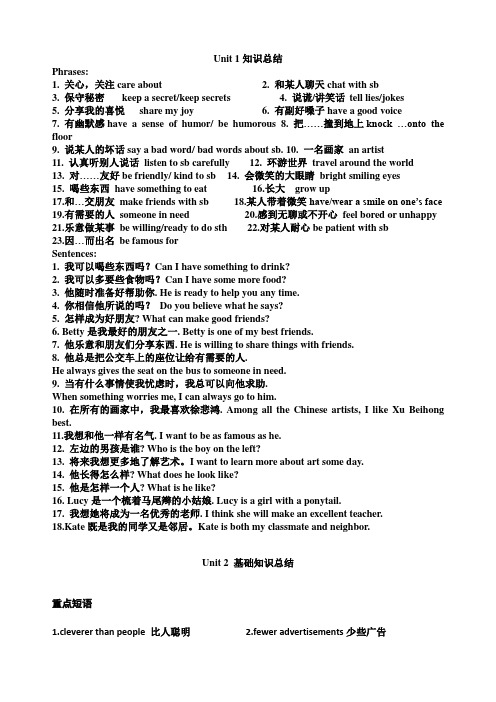
Unit 1知识总结Phrases:1. 关心,关注care about2. 和某人聊天chat with sb3. 保守秘密keep a secret/keep secrets4. 说谎/讲笑话tell lies/jokes5. 分享我的喜悦share my joy6. 有副好嗓子have a good voice7. 有幽默感have a sense of humor/ be humorous 8. 把……撞到地上knock …onto the floor9. 说某人的坏话say a bad word/ bad words about sb. 10. 一名画家an artist11. 认真听别人说话listen to sb carefully 12. 环游世界travel around the world13. 对……友好be friendly/ kind to sb 14. 会微笑的大眼睛bright smiling eyes15. 喝些东西have something to eat 16.长大grow up17.和…交朋友make friends with sb 18.某人带着微笑have/wear a smile on one’s face 19.有需要的人someone in need 20.感到无聊或不开心feel bored or unhappy 21.乐意做某事be willing/ready to do sth 22.对某人耐心be patient with sb23.因…而出名be famous forSentences:1. 我可以喝些东西吗?Can I have something to drink?2. 我可以多要些食物吗?Can I have some more food?3. 他随时准备好帮助你. He is ready to help you any time.4. 你相信他所说的吗?Do you believe what he says?5. 怎样成为好朋友? What can make good friends?6. Betty是我最好的朋友之一. Betty is one of my best friends.7. 他乐意和朋友们分享东西. He is willing to share things with friends.8. 他总是把公交车上的座位让给有需要的人.He always gives the seat on the bus to someone in need.9. 当有什么事情使我忧虑时,我总可以向他求助.When something worries me, I can always go to him.10. 在所有的画家中,我最喜欢徐悲鸿. Among all the Chinese artists, I like Xu Beihong best.11.我想和他一样有名气. I want to be as famous as he.12. 左边的男孩是谁? Who is the boy on the left?13. 将来我想更多地了解艺术。
人教新目标英语八年级上册unit1-Unit4单元重点知识复习
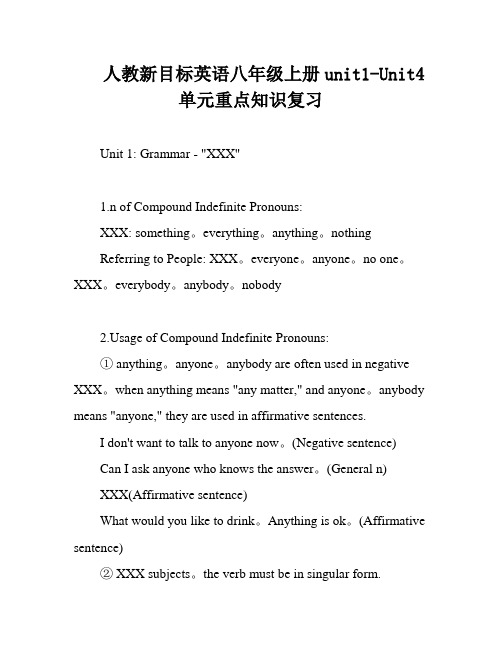
人教新目标英语八年级上册unit1-Unit4单元重点知识复习Unit 1: Grammar - "XXX"1.n of Compound Indefinite Pronouns:XXX: something。
everything。
anything。
nothingReferring to People: XXX。
everyone。
anyone。
no one。
XXX。
everybody。
anybody。
nobodyage of Compound Indefinite Pronouns:① anything。
anyone。
anybody are often used in negative XXX。
when anything means "any matter," and anyone。
anybody means "anyone," they are used in affirmative sentences.I don't want to talk to anyone now。
(Negative sentence)Can I ask anyone who knows the answer。
(General n)XXX(Affirmative sentence)What would you like to drink。
Anything is ok。
(Affirmative sentence)② XXX subjects。
the verb must be in singular form.Everyone here is from China.XXX.③ Adjectives XXX.Would you like to buy anything special?Can XXX interesting?④ When making requests。
八年级上册每单元语法讲解汇总

八年级上册每单元语法讲解汇总Unit1 Where did you go on vacation ?不定代词一、概念不指明代替任何特定名词或形容词的代词叫不定代词。
二、常见的不定代词some 一些somebody 某人someone 某人something 某事any 一些;任何anybody 任何人anyone 任何人anything任何事no 无nobody 无人no one 无人nothing 无物every 每个everybody 每人;大家;人人everyone 每人everything 每件事;一切all 全体;全部both 两个(都)none 没人或物(指两个以上) neither 没人或物(指两个当中) either 任何一个(指两个当中) each每个other(s) 另一个(些)another 另外一个;又一个much 很多many很多few几乎没有a few一些;几个little 几乎没有a little 少数几个【例1】—Who helped you repair your bike?—______!I repaired it all by myself.A.Anybody B.EverybodyC.Somebody D.Nobody点拨:根据答语“我自己修的”可知是“没人”,故D项正确。
句意为“——谁帮你修的自行车?——没人。
我自己修的”。
答案:D【例2】Make sure you've got the tickets and guidebooks and ______before you leave.A.something B.anythingC.everything D.nothing点拨:句意为“确保你离开前,带好票、指南以及所有的东西”,故C项正确。
答案:C【例3】She has written a lot of books,but______ are good ones.A.any B.someC.few D.many点拨:根据but可知前后意思表示转折,“她已经写了许多书”,但是“几乎没有好的”,故选C项。
Units1-4单元复习知识点人教版八年级英语上册

第一单元重点语法【一般过去时】1.概念:表示过去某个时间里发生的动作或状态;过去习惯性、经常性的动作、行为;过去主语所具备的能力和性格。
2.时间标志词1. yesterday, the day before yesterday2. 时间段+ago: three years ago, long ago…3. last: last day/ week/ year…4. in+过去年份: in 2015…5. just now 刚才【复合不定代词】复合不定代词是由some-,any-,no-,every-加上-one,-body,-thing等所组成的不定代词。
例如:Everyone wants to win.考向二:复合不定代词被形容词修饰,形容词后置例如:I have something interesting to tell you.考点三:辨析something/someone/somebody,anything/anyone/anybody,nothing/noone/nobody,everything/everyone/everybody1.something,someone,somebody通常用于肯定句中2.anything,anyone,anybody一般用于否定句、疑问句或条件状语从句中。
3. not....anything = nothing注意:1)在表示请求、邀请、提建议等带有委婉语气的疑问句,和希望得到对方肯定答复的疑问句,以及表示反问的问句中,也用something,someone,somebody等复合不定代词。
如:Would you like something to eat?2)当anything表示“任何事(物),无论何事(物)”,anyone,anybody表示“无论谁,任何人”等意义时,它们也可以用于肯定句中。
如:Anybody knows the answer.任何人都知道答案。
新人教版八年级上册英语单元语法及知识点概述
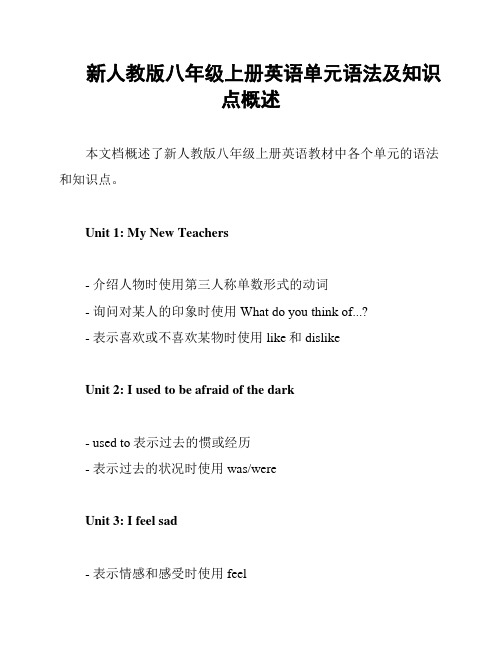
新人教版八年级上册英语单元语法及知识点概述本文档概述了新人教版八年级上册英语教材中各个单元的语法和知识点。
Unit 1: My New Teachers- 介绍人物时使用第三人称单数形式的动词- 询问对某人的印象时使用What do you think of...?- 表示喜欢或不喜欢某物时使用like和dislikeUnit 2: I used to be afraid of the dark- used to表示过去的惯或经历- 表示过去的状况时使用was/wereUnit 3: I feel sad- 表示情感和感受时使用feel- 使用be动词+形容词表达情感状态- 表示总是或经常做某事时使用always或often Unit 4: What's the best movie theater?- 比较级和最高级的用法- 询问建议时使用What do you suggest?- 表示原因时使用becauseUnit 5: It must belong to Carla- 表示推测或某事是肯定的时使用must- 表示推测或某事是可能的时使用might- 表示推测或某事是否定的时使用can'tUnit 6: I like music that I can dance to- 表示喜欢某种中性事物时使用like- 表示喜欢可以+动词原形的事物- 表示不喜欢不可以+动词原形的事物Unit 7: Teenagers should be allowed to choose their own clothes- 表示应该或不应该做某事时使用should or shouldn't- 表示能够或不允许做某事时使用can or can't- 使用be动词+动词不定式表示被允许或不被允许做某事Unit 8: Home alone- 表示需要或必需做某事时使用have to- 表示过去需要或必需做某事时使用had to- 表示建议或推荐时使用should或had betterUnit 9: When was it invented?- 使用一般过去时表示过去的经历或事件- 使用一般过去时的疑问句形式提问过去的经历或事件- 使用介词短语表示一段时间以上是新人教版八年级上册英语教材中各单元的语法和知识点概述。
八年级上册1~4单元英语知识总结

八年级上册1-4知识点Unit1 How often do you exercise?词法知识点:频度副词Always> usually> often> sometimes(sometime some times some time)> hardly ever> never一次once 两次twice 三次Three times a week everyday-every dayOr表示选择three or four times a weekAs for 对于…The results for watch TV are interesting.result from/inwant sb to do sthlook after-take care maybe-may bepart of一部分come home from school try to do/try doing help sb to do sth/help sb do sth the same askind of+形容词although出现不用butget up at+时间点be good for/ be bad for go skateboarding/swimming/climbing the mountains 句法:对频率进行提问以及回答What do you usually do on weekends? I sometimes go to the beach.How often do you exercise? Every day.提问喜好What’s your favorite program?= What program do you like best?What sports do you play?注意:提问时对象是单三或者是复数时动词的形式How often does Cheng watch TV?He watches TV twice a week.Unit2 What’s the matter?词法:表示人体器官的名词:stomach throat back teeth feet疾病名称:illness cold fever headache toothache stomachache sore throat Give advices keep a balance be popular go out at night go to bedstay healthy solve problem at the moment conversation practicehost family lie down and rest hot tea with honey see a dentisttoo much/much too stressed out it’s easy to do it’s important to do sth句法:询问病症What’s the matter? I have a headache.给出建议You should drink some tea.That’s too bad.安慰祝愿I wish you feel better soon.What’s the trouble/up/wrong with you?情态动词的用法:should 表示义务责任或用于征询情况或者意见。
人教新目标英语八年级上册unit1-Unit4单元重点知识复习
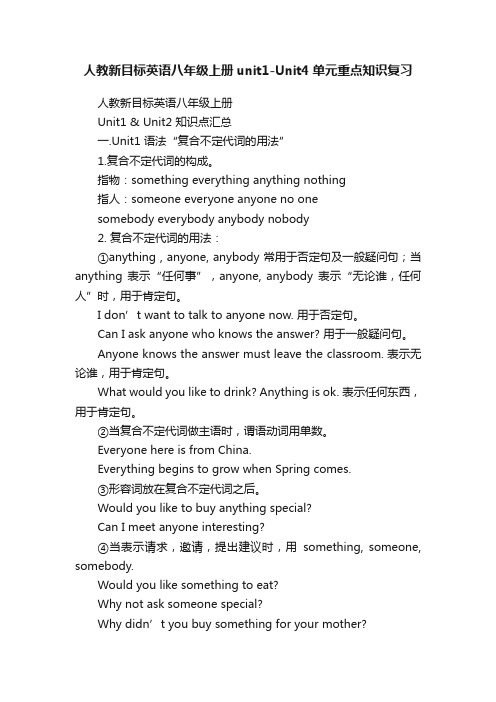
人教新目标英语八年级上册unit1-Unit4单元重点知识复习人教新目标英语八年级上册Unit1 & Unit2 知识点汇总一.Unit1 语法“复合不定代词的用法”1.复合不定代词的构成。
指物:something everything anything nothing指人:someone everyone anyone no onesomebody everybody anybody nobody2. 复合不定代词的用法:①anything , anyone, anybody 常用于否定句及一般疑问句;当anything 表示“任何事”,anyone, anybody 表示“无论谁,任何人”时,用于肯定句。
I don’t want to talk to anyone now. 用于否定句。
Can I ask anyone who knows the answer? 用于一般疑问句。
Anyone knows the answer must leave the classroom. 表示无论谁,用于肯定句。
What would you like to drink? Anything is ok. 表示任何东西,用于肯定句。
②当复合不定代词做主语时,谓语动词用单数。
Everyone here is from China.Everything begins to grow when Spring comes.③形容词放在复合不定代词之后。
Would you like to buy anything special?Can I meet anyone interesting?④当表示请求,邀请,提出建议时,用something, someone, somebody.Would you like something to eat?Why not ask someone special?Why didn’t you buy something for your mother?Unit2 语法“频率副词”How often 常用于对频率的提问,意为“多长时间一次”,其答语可以是once/ twice / three times a week; always/ usually/ often/ sometimes/ hardly ever/ never 等表示时间频率的副词及短语。
初中英语八上U1--U10知识点

初中英语八上U1--U10知识点初中英语八年级上册的知识点涵盖了多个方面,包括词汇、语法、句型、阅读和写作技能等。
以下是对U1至U10单元知识点的概述:Unit 1: Friends- 词汇:学习与友谊相关的词汇,如friend, friendly, kind, helpful等。
- 语法:现在进行时的构成和用法。
- 句型:询问和描述某人正在进行的活动。
Unit 2: School Life- 词汇:学习与学校生活相关的词汇,如class, subject, homework, project等。
- 语法:一般现在时的构成和用法。
- 句型:表达喜好和不喜欢,以及询问某人的喜好。
Unit 3: A Day Out- 词汇:学习与户外活动相关的词汇,如park, zoo, museum, picnic 等。
- 语法:一般过去时的构成和用法。
- 句型:叙述过去发生的事情。
Unit 4: Do It Yourself- 词汇:学习与手工活动相关的词汇,如tool, paint, glue, craft 等。
- 语法:情态动词can的用法。
- 句型:表达能力或请求帮助。
Unit 5: Wild Animals- 词汇:学习与野生动物相关的词汇,如tiger, elephant, lion, habitat等。
- 语法:现在完成时的构成和用法。
- 句型:描述动物的习性和生活环境。
Unit 6: Birdwatching- 词汇:学习与鸟类观察相关的词汇,如bird, feather, nest, migration等。
- 语法:形容词比较级和最高级。
- 句型:比较不同鸟类的特征。
Unit 7: Seasons- 词汇:学习与四季相关的词汇,如spring, summer, autumn, winter等。
- 语法:一般将来时的构成和用法。
- 句型:表达将来的计划和预测。
Unit 8: Holidays- 词汇:学习与假期相关的词汇,如holiday, festival, vacation, travel等。
八年级上1--6单元Grammar语法
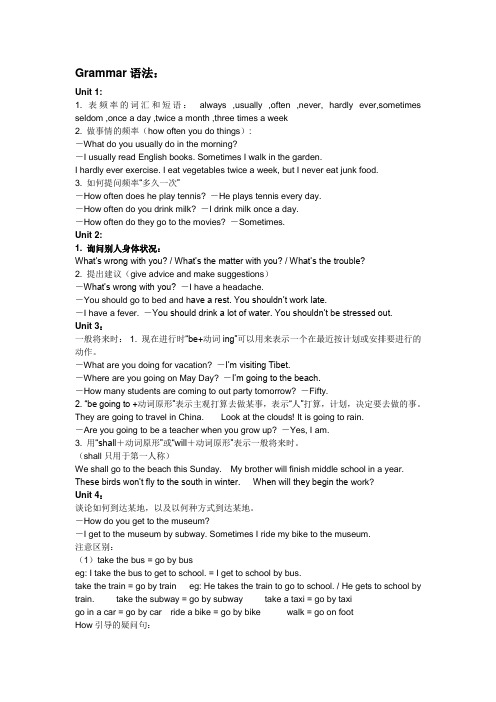
Grammar语法:Unit 1:1. 表频率的词汇和短语:always ,usually ,often ,never, hardly ever,sometimes seldom ,once a day ,twice a month ,three times a week2. 做事情的频率(how often you do things):-What do you usually do in the morning?-I usually read English books. Sometimes I walk in the garden.I hardly ever exercise. I eat vegetables twice a week, but I never eat junk food.3. 如何提问频率“多久一次”-How often does he play tennis? -He plays tennis every day.-How often do you drink milk? -I drink milk once a day.-How often do they go to the movies? -Sometimes.Unit 2:1. 询问别人身体状况:What’s wrong with you? / What’s the matter with you? / What’s the trouble?2. 提出建议(give advice and make suggestions)-What’s wrong with you? -I have a headache.-You should go to bed and h ave a rest. You shouldn’t work late.-I have a fever. -You should drink a lot of water. You shouldn’t be stressed out.Unit 3:一般将来时:1. 现在进行时“be+动词ing”可以用来表示一个在最近按计划或安排要进行的动作。
牛津译林版八年级英语上册units1-4单元语法讲解

牛津译林版八年级英语上册units1-4单元语法讲解形容词、副词等级的用法原级的用法①只能修饰原级的词:very,quite ,so,too,rather。
如:He is too tired to walk on. 他太累了以至于不能再继续走了。
②....................... as...as.•和一样(中间用原级)not as(so). ..as和不一样(中间用原级)如:Tom is _________ Kate. 汤姆和凯特年龄一样大。
Tom is _____________ Kate. 汤姆的年龄是凯特的两倍。
This room is ________________ that one. 这个房间不如那个大。
比较级的用法①可以修饰比较级的词:______ , a lot,far,_____ ,a bit,even,still 。
②...tha n... •比...如:Tom is taller than Kate. 汤姆比凯特高。
③选择疑问句中,二选一时女口:Which is________ , the earth or the moon?哪一个更大,地球还是月球?④用比较级表示最高级的意思如:The Yangtze River is longer than __________ in China. 在中国,长江比其他任何一条河都长。
⑤比较级+ and +比较级"表示越来越....... ”如:He is getting ____________ . 他变得越来越高了。
The flowers are __________________ . 花儿越来越漂亮了。
⑥“te+比较级,the +比较级"表示越...... ,就越 ... ”如:The ____________ you are, _______________ you'll make. 你越认真,犯的错误就越少。
八年级英语上册1-4单元知识点总结

新目标八年级英语上册第一单元Unit 1.How often do you exercise?I. 重点短语归纳:on weekends 在周末1. go to the movies 去看电影2. look after=take care of 照顾3. surf the internet 上网4. healthy lifestyle 健康的生活方式5. go skateboarding 去滑滑板watch TV看电视6. keep healthy=stay healthy = keep in good health 保持健康keep + 形容词表保持某种状态do some reading 阅读7. exercise= take/do (much) exercise=do sports锻炼8. eating habits 饮食习惯9. take more exercise 做更多的运动10. the same as 与什么相同11. once a month一月一次12. be different from 不同13. twice a week一周两次.three times a week一周三次14. make a difference to 对什么有影响As teachers, you must believe that you can make a difference to the lives of your st udents.身为教师,你们必须坚信你们能够影响学生的一生。
A false step will make a great difference to my future.错走一步对我的前程来说会产生很大影响。
15. how often 多久一次,询问动作发生的频率how many times 多少次,用来提问做某事的次数16. although=though虽然 <不能与but连用>Although he is old, he is quite strong.(He is old, but he is quite strong.)句子中,有although或though就不可再用but,但可用yet或still“仍然,还”;有because就不能再用so.17. most of the students=most students大多数学生18. shop=go shopping=do some shopping 购物19. as for至于20. activity survey活动调查21. do homework做家庭作业22. do house work做家务事23. eat less meat吃更少的肉24. junk food垃圾食物25. be good for 对什么有益26. be bad for对什么有害27. want to do sth 想做某事28. want sb to do sth想某人做某事29. try to do sth 尽量做某事30. come home from school放学回家31. of course=certainly=sure当然32. get good grades取得好成绩33. some advice 一些建议some advice 中的advice 是不可数名词 a piece of advice 一则建议 give advice 提出建议take one’s advice 采纳或听从某人的建议4. help sb to do sth帮助某人做某事=help sb with sth35. a lot of vegetables=many vegetables许多蔬菜36. hardly= almost not几乎不 hardly ever很少,几乎不,从不37. keep/be in good health保持健康38.your favorite program你最喜欢的节目39. Animal World 动物世界40. play soccer踢足球41.every day 每天every day 与 everyday1. every day 作状语,译为“每一天”。
- 1、下载文档前请自行甄别文档内容的完整性,平台不提供额外的编辑、内容补充、找答案等附加服务。
- 2、"仅部分预览"的文档,不可在线预览部分如存在完整性等问题,可反馈申请退款(可完整预览的文档不适用该条件!)。
- 3、如文档侵犯您的权益,请联系客服反馈,我们会尽快为您处理(人工客服工作时间:9:00-18:30)。
Unit 1------ Unit 2(八年级上) ———————————————————— 2015.08—————————Diction语法精讲一、形容词比较级最高级的构成及用法形容词比较级最高级规则变化1.一般+er/esteg:cold strong fast slow2.以字母e结尾+r/steg:nice large3.词末只有一个辅音字母时,应先双写辅音字母+er/esteg: thin fat4.以“辅音字母+y”结尾的双音节词,先改“y”为“i”,+er/esteg: funny easy5.多音节词和部分双音节词,在词前加more/mosteg: beautiful serious不规则变化Many/much:more mostgood/well:better bestLittle:less leastfar:farther/further;farthest/furthestold:older/elder;oldest/eldestclever:cleverer/more clever;cleverest/ most clever形容词原级的用法1.表示两者“相等”用,as+形容词原级+as +比较对象;★那个男孩和那个女孩一样大。
The boy is the girl.★李磊说英语说得和露西一样好。
Li Lei speaks English ___________Lucy.2.表示“不如”没有“不相等”,用“not + as / so+形容词原级+as+比较对象”;★月亮没有太阳大。
The moon is ____________ the sun.形容词比较级的用法1.表示两者进行比较:A …+比较级+than +B (注意比较的对象要一致)★中国的人口比印度的多。
The population in China is ____________ that of India.★我的自行车比她的更美。
My bike is _______________than hers.2.表示两者之间进行选择“哪一个更…”时,用句型“which/who is +形容词比较级,A or B ?”表示。
月亮和地球相比,哪一个离太阳更近呢?Which is___________ the sun, the moon or the earth?3.形容词被表示程度的副词very、so、too 、enough、quite等词修饰时用形容词原级。
★这是一个非常有趣的故事。
This is a ______interesting story拓展用法4. the + 形容词比较级+ of 短语两者中比较……的一个她是两个女孩中比较漂亮的那一个。
She is_________of __________5.“the+比较级...the+另一个比较级”表示越…越…;★你越多得运动你的手臂,你就会变得越健康。
__________ you move your arms,____________you will be.6.表示“……是……的几倍”,用“倍数+as+原级+as”结构,或者“倍数+比较级+than”结构。
★这间教室是那间的三倍大。
This classroom is ___________________ as that one.形容词最高级的用法1.三者、三者以上的比较,一般用最高级;形容词最高级前必须加定冠词the,句末常用介词in/of/among 语表示比较的范围.我妈妈是我家最忙的那一个。
My mother is ________________in my family.2.序数词+形容词的最高级表示:“第几最…”★她是我们班第二高的女生。
She is __________________girl in our class.3. 形容词性物主代词+最高级表示:某人或某物的“最…”★我最大的梦想是可以环游世界。
_________________ is traveling around the world拓展用法4.表示三者或三者以上的人或物中进行选择时,用“Which/who is +the +最高级,A,B or C ?”结构。
谁最高?汤姆,凯特,还是比尔?___________________,Tom, Kate or Bill?5.表示“最……之一”用:one of +the+最高级+ 复数名词(注:谓语动词用单数形式)★高老师是我们学校最受欢迎的老师之一。
Miss Zhao is ____________________________in our school.6.最高级前一般要加“the”;当最高级前有物主代词、指示代词、名词所有格等修饰时,则不加“the”。
她是我最好的朋友。
She is __________friend.二、时态讲解1.一般现在时[概念解说]一般现在时表示现在的一段时间内经常发生的动作或存在的状态。
其谓语动词第三人称单数要在词尾加"-s或-es",其余用原形。
与它形影不离、亲密无间的频度副词和时间状语有often, always,sometimes, usually, every day等。
[用法点击]1)表示现在存在的习惯、经常发生的动作或存在的状态。
如:Lucy works very hard.2)表示客观真理或事实。
如:The earth moves around the sun.3)表示按计划、安排将要发生的动作。
这时的谓语动词一般是一些表示位置转移或有开始意义的词。
例如:The meeting starts at seven tomorrow.4)在here, there开头的句子中,常用一般现在时取代现在进行时。
如:There goes the bell!2.现在进行时[概念解说]表示现在正在进行的动作。
其构成形式是:am / is / are + doing[用法点击]1)表示现在(说话瞬间)正在进行或发生的动作。
如:What is he doing in the next room at the moment?2)表示当前一段时间或现阶段正在进行的动作。
如:Mr Green is writing a book these days.3)表示按计划即将发生的事情,常与go, come, leave等词连用。
如:The train is leaving for Beijing soon.4)现在进行时与always连用,还可表示赞叹、厌烦、表扬、批评等不同情感。
如:Joy is always helping others. (表扬)3.一般过去时[概念解说]表示过去发生的动作或存在的状态,讲述过去的事实。
与一般过去时不见不散的"close friends"有yesterday, the day before yesterday, last year / month / night / week, just now, two days ago, then, in 1999 / 1988等。
[用法点击]1)表示过去发生的动作或存在的状态。
如:John had a birthday party last Monday.2)表示过去连续发生的一连串动作。
如:Mother went to a bookshop and bought an English dictionary for me this morning.3)表示过去某一段时间内经常、反复发生的动作。
如:When I was young, I always played football after school.4.一般将来时[概念解说]一般将来时表示在将来某一时间将要发生的动作或存在的状态,也可表示将来某一段时间内经常发生的动作或存在的状态。
它常与表示将来的时间状语如soon, tomorrow, next week, in a few days, the day after tomorrow等合作。
【课堂检测】姓名:得分:一、用所给词的适当形式填空1. Tom is ____ (tall) than Jim.2. Li Lei is _____ (young) boy in his class.3.David has ____ (many) story books of all the students.4.Li Lei speaks English _______ (well) in his group.5.Lucy runs _____ (slow) than Lily.6. "Listen! Who___ (sing) in the next room?" "Maybe it is Wang Lin. She likes ______ (sing) a lot ."7. I was doing my homework when the light _______ (go) out.8. The story_______ (happen) many years ago.9. At night we can always see him _______ (study) in the room .10. He usually _______ (get) up early, but he _______ (get) up very late this morning.二、单项选择1. ---Who’s ______ basketball player in China now? Is it Yao Ming?---No,It’s Sun Mingming。
A.tallB. tallerC. the tallestD.tallest2. English is one of ______ important subjects in our schoolA. mostB. the mostC. moreD. much more3. Which boy is ______, Jim, Mike or Tom?A. tallerB. the most tallC. the tallestD. the taller4. Of all the ball games, I like baseball ______. it’s really my favorite.A.wellB. goodC.betterD. best5. The price of this computer is the _____ of the three.A. smallestB. biggestC. highestD. tallest6. The Yellow River is one of ______rivers in ChinaA. longB. longer C the longestHomework:1. □2. □3.一、用所给词的适当形式填空1. Bob is _____( young ) than Fred,but is __________(tall) than Fred2. Annie says Sally is the ________ (kind) person in the world.3. An orange ia a little ______ (big) than an apple, but much ________ (small) than a watermelon.4.Tom says he _______ (leave) for Beijing next week if it _______ (not rain).5. How often _______ Lucy _______ (help) Granny Wang to clean the house?6. Everything _______ (go) well so far.7. Stop _______ (laugh). I _______ (can not hear) what the teacher _______ (say).8.Though chocolate ______ (taste) good, my doctor ______ (not allow) me _______ (eat) too much.9. Look! The children ____________ (plant) flowers in the garden.10.Mr Dong often ____________ (meet) up with his friends in the new park.二、单项选择1. She is ________ than ________ .A. busier / usB. busier / weC. more busy / usD. more busy / we2. China is ________ country in the world.A. the third largestB. the largest thirdC. the third largeD. a third largest3. -Which is ____ season in Beijing?-I think it's autumn.A.goodB.betterC.bestD.the best4.Which is__________ , the sun, the moon or the earth?-- Of course, the moon is.A.smallB.smallerC.smallestD.the smallest5.The air in Beijing is getting much _____ now than a few years ago.A. cleanB. cleanerC. cleanestD. the cleanest。
